Mauricio Pochettino: Just who is the man behind Spurs' title bid?
- Published
- comments
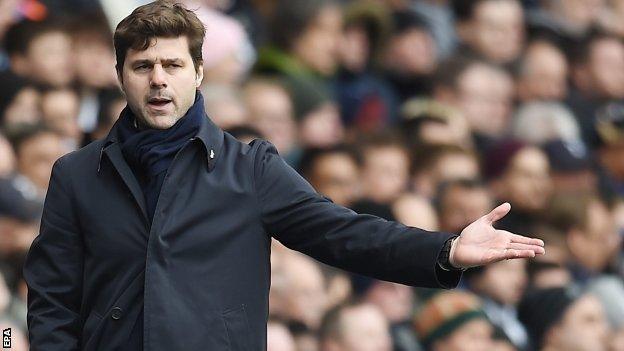
Mauricio Pochettino's Tottenham remain firmly in the hunt for their first title since 1961
Early in February, several newspapers ran a story claiming Sir Alex Ferguson rated Tottenham boss Mauricio Pochettino as the best manager in the Premier League.
The former Manchester United boss had been sitting next to David Lammy, the MP for Tottenham, at a dinner shortly before Christmas when he apparently made the disclosure., external
It's a big claim but with the season entering its final stretch Tottenham remain firmly in the hunt for the Premier League title.
They have not won the league since 1961 - but they are second in the table, five points behind Leicester.
And if the men from the Lane do go on to clinch the title, their 44-year-old Argentine manager will undoubtedly be given a huge amount of credit for what would be an achievement as stunning as it was unexpected.
But who exactly is the man who might be about to bring the Glory, Glory Days back to the Lane?
Learning from El Loco - the Argentine years
Marcelo Bielsa is not known as El Loco - The Madman - for nothing. He rambles on for hours at news conferences but never gives interviews. He reckons that if players were machines he would never lose.
He once turned up at the house of a 14-year-old Pochettino in the small town of Murphy at 2am. He was accompanied by Jorge Griffa, at the time also a coach at Newell's Old Boys and credited with unearthing the likes of Gabriel Batistuta and Carlos Tevez. After inspecting the teenager's legs, the story goes, they promptly signed him.
But mad or not, Bielsa is probably the key figure in Pochettino's footballing life.
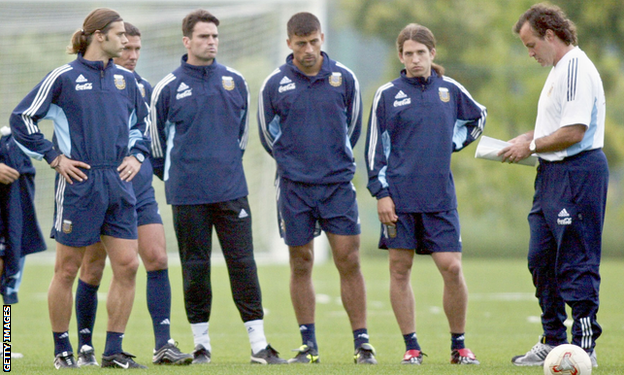
Pochettino (left) played for Argentina under Bielsa as well as Newell's and Espanyol
"He is like my father," said the Spurs boss when his compatriot was linked with the Swansea job earlier in the season. "I know him since I was 14 at Newell's Old Boys."
Pochettino was born in Murphy, Santa Fe, the son of a farm labourer, and remained with Newell's, based two hours up the road in Rosario in the north of Argentina, until he moved to Spanish side Espanyol in 1994.
At the age of 18, the central defender won the Argentine title at Bielsa's Newell's in 1991 and reached the final of the Copa Libertadores the following season, losing to Tele Santana's Sao Paulo on penalties. It was a stunning achievement for a modest club.
"When we won the titles and reached the final of the Copa Libertadores, we were very similar to the squad that we have now at Tottenham in terms of the average age of the squad and in the balance between younger and experienced players," Pochettino said recently.
"There were very good youngsters - like me - and very good experienced players. A similar balance, a similar project."
Bielsa espoused an intense, fast-tempo and high-pressing game, suffocating the opposition. He needed - and had - complete buy-in from his youthful side for this to work.
"That Newell's side was a team shaped with lots of youngsters," said Argentine football journalist Martin Mazur. "It was nothing like the present day, when the system needs to promote youngsters to fill the gaps of the mid-20s generation that is almost entirely playing in Europe. In the late 80s and early 90s, Argentine exports were limited and it wasn't natural or easy to bet on a new generation.
"Bielsa was promoted after working with the academy, but had no illustrious history as a player or as a manager.
"He was frowned upon by veteran players such as Tata Martino or Juan Manuel Llop, and was admired by a core of young players, namely Pochettino and Fernando Gamboa, who became soldiers of his cause: attacking football, high pressing, mechanised movements, new training methods close to exhaustion, physical dominance, a dynamic 4-3-3 that could reshape into a 3-4-3 depending on the circumstances.
"Actually, more than soldiers, they were all generals with their responsibilities, but also active in the decision-making process. Pochettino was the left centre-back or stopper, and he grew up with that style and embracing the audacious and ambitious plan of defying odds and history."
It is difficult to underestimate the impact that Bielsa had on the careers of Pochettino and fellow defenders such as Gamboa, Eduardo Berizzo and Julio Saldana.
Bielsa tasked them with scouting the opposition and asked them to present their reports in front of the squad. In an age before the internet, he told them to read three newspaper reports of their previous game, as well as sports weekly El Grafico.
Bielsa went on to manage Argentina at the 2002 World Cup, with Pochettino fouling England striker Michael Owen for the penalty David Beckham converted - the only goal of the match. Argentina travelled to Japan and South Korea as one of the favourites but failed to qualify from their group.
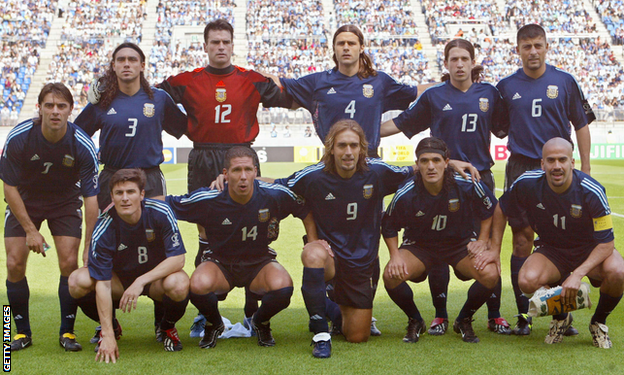
Pochettino (wearing number four) played for Argentina against England at the 2002 World Cup and has always maintained that England striker Michael Owen dived for the penalty awarded during that match
"Owen had the ball. I stuck out my foot and he dived. In that moment, Michael was more Argentine than me," said Pochettino.
Pochettino retired from international football that same year. By that time he had not only played under Bielsa at Newell's and in the national team but also, briefly in 1998, at Espanyol.
"Pochettino's years in Spain and France, while playing internationally for Argentina, naturally made him more mature, but the mindset didn't change," added Mazur. "Some players realise they want to be managers when they're close to hanging up their boots. Pochettino was a manager almost from the first day he wore them."
Archive: Beckham's Argentina redemption
The transition to manager - the Espanyol years
Pochettino moved to Europe in 1994, when he joined Barcelona-based La Liga side Espanyol. He was popular at the Catalan club, making nearly 300 appearances over the course of the next 12 years.
The highlight of his playing days with Espanyol was a Copa del Rey triumph in 2000, and although he then left to join Paris St-Germain and later Bordeaux, he was popularly received when he returned to the club, winning another Spanish Cup in 2006.
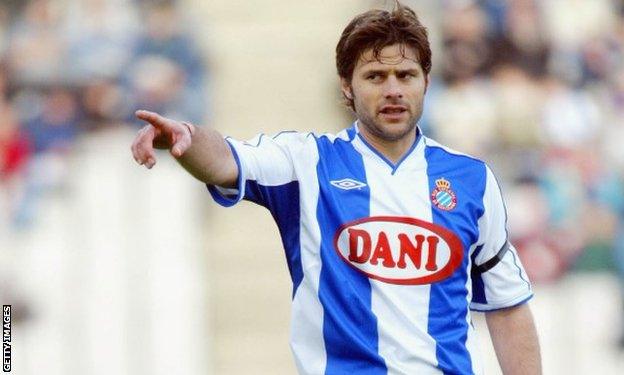
Pochettino emerged as a natural leader during his playing days at Espanyol
Pochettino's ascent into management was far from immediate, with nearly three years elapsing between the end of his playing career and his appointment at Espanyol.
During that time he gained the necessary qualifications and served as assistant coach for the club's ladies' team.
When the call came, it was sudden and urgent. German Bona, who reports on Espanyol for newspaper Sport, recalls: "He took over in January 2009 with the team in the relegation zone.
"He was the team's third coach of the season and it was a huge challenge in a very important season because the club were moving to a new stadium in the summer and didn't want to start there in the second division."
Pochettino, using methods forged playing under Bielsa, had an immediate impact, leading his team to a famous 2-1 win against bitter rivals Barcelona at the Nou Camp to spark a much-improved run of form which ultimately led to a comfortable mid-table finish.
He kept the team in that position for another three years, but eventually dire financial problems and internal boardroom strife took their toll and, after a poor start to the 2012-13 campaign, Pochettino was sacked.
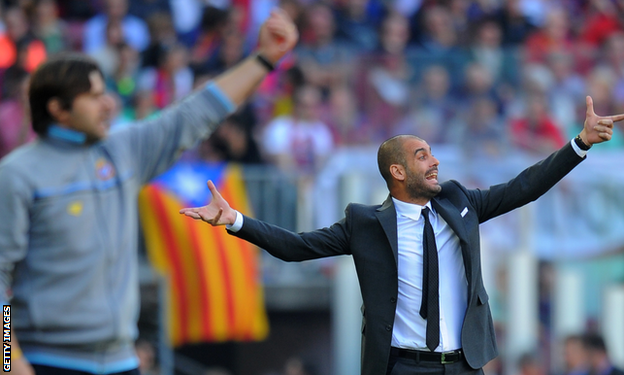
Pochettino ran Espanyol while Guardiola coached Barcelona - Guradiola remarked at the time that he felt "very close" to the Argentine's style of play
"If there's one thing that stands out from his time at Espanyol, it was the way he controlled everything at he club," added Bona.
"He changed lots of small details at Espanyol that other coaches wouldn't have noticed, such as what and when the players ate, and he was a leader in everything that he did. You could see that people listened to him and were convinced by him."
Pochettino had an insatiable work ethic and expectations of similarly high standards from everyone around him.
"He spent many hours every day at the training ground," recalls Bona. "He arrived early in the morning and left late at night, which isn't particularly common in Spanish football.
"He wants a team which works like a clock, where everything functions perfectly. Not just the players, but also everything which surrounds the team: the medical staff, his assistants, club officials and so on."
A final characteristic of Pochettino's time at Espanyol, which is now being witnessed at White Hart Lane, was his willingness to embrace young players into his plans, introducing more than 20 youth-teamers into the senior ranks during his three years in charge.
Dealing with his captain's death |
|---|
Pochettino was in charge of Espanyol when captain Daniel Jarque, 26, died, external in 2009 after suffering cardiac arrest following a pre-season training session. |
Jarque's girlfriend was pregnant when he died. The daughter was born a few weeks later, on 23 September. It coincided with Espanyol winning their first match in their new stadium. After the game Pochettino dedicated the victory to the baby and the mother. |
"I remember those painful days very well because I was there in Italy reporting on Espanyol at the time it happened," said journalist German Bona. |
"We came back on the plane with the team from Florence the day it happened, and there was absolute, painful silence on the plane. |
"Just a few weeks before the tragedy Pochettino had decided to give the captain's armband to Jarque. It wasn't a straightforward decision because the captain until then was Raul Tamudo, the leading Catalan goalscorer in the history of La Liga. But he wanted the captain to be his leader and the projection of himself on the field of play. |
"When the tragedy occurred, it affected Pochettino as much as the rest of the team. It took a few months before they found their rhythm in games and cost them some victories." |
His way or no way - the Southampton years
Many Southampton supporters were far from pleased when their club decided to discard Nigel Adkins in January 2013 after he had won back-to-back promotions from League One to the Premier League. Former Saints midfielder Jamie Redknapp said the chairman was "deluded".
Their anger was not soothed by the decision to appoint someone who could not speak English and had never worked in the country before.
They were complaining again when Pochettino left, but this time because the club had failed to keep him. He had arrived with Saints third from bottom in the Premier League and left in May 2014 after Southampton had finished eighth.
"I don't have a life outside football," said Pochettino when interviewed during his first few months at St Mary's.
"I spend about 12 hours per day at the training ground. Basically my life is to go from the hotel to the training ground. I am living fully dedicated to this club. In football there is not really a timetable, we just work all day long. I don't consider this work - this club is a passion."
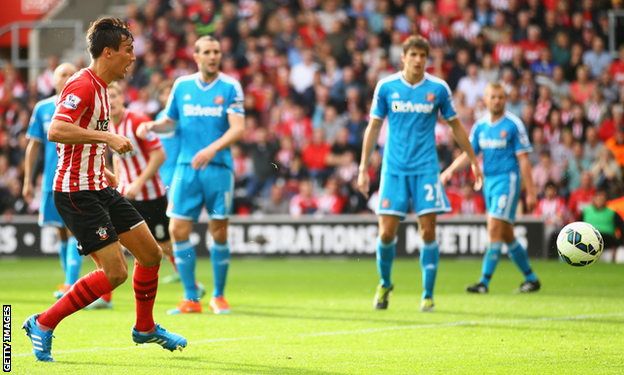
Midfielder Jack Cork, then at Southampton but now at Swansea, believes Pochettino improved him as a player
Jack Cork was at Southampton for the whole of Pochettino's time there and was sold to Swansea in January 2015.
"Things settled down quickly after Mauricio arrived," Cork told BBC Sport. "It was always his way or no way, but we were a young team and he gave us confidence - and his message was always to enjoy our football.
"I don't think he did an interview in English the whole time he was there but he always managed to get his message across to the players. He was quite calm most of the time.
"I remember one game at Wigan when we had come from behind to take the lead with five minutes to go. We conceded in the last minute and I thought he was going to be really angry. Instead he had a few minutes to himself in the shower and came out and shook every player's hand.
"He was full of ideas. We went on a pre-season tour to Spain and he had organised a team-building exercise which involved an arrow. Each player had to place the point of the arrow into the soft tissue area of their throat while a team-mate held the other end. You then had to push against the arrow until it bent or snapped.
"It was plastic or something and there was no chance of injuring yourself. It was all to do with building up trust in your team-mates. We also had to walk across hot coals. The players all embraced it.
"There was always lots of running and a lot of training with Mauricio. At times it was very tough. You needed two hearts to play the Pochettino way. Goalkeeper Kelvin Davis once brought the clock out of the dressing room to remind him how long the session had been.
"But his methods worked. We started the 2013-14 season with just one defeat in the first 11 league games.
"There was a lot of talk towards the end of the season that he was going. I remember bumping into him and asking him outright if he was leaving. He laughed and played it down. Because of the timing of his departure, just after the end of the season, there were no big goodbyes because everyone was away. I've seen him since and he's always taken the trouble to ask me how I'm doing and how my family are."
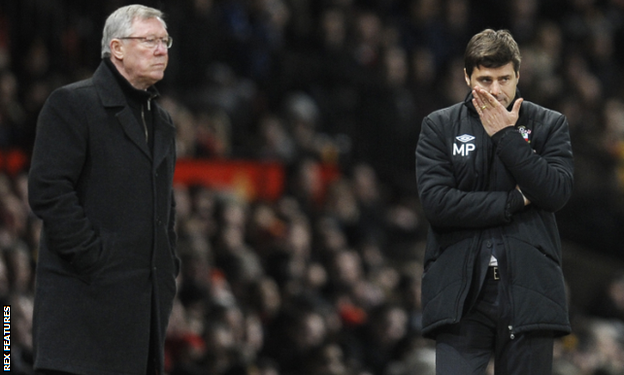
Sir Alex Ferguson reportedly rates Pochettino as the best in the Premier League
Restoring Glory at the Lane? - the Tottenham years
Tottenham gave Pochettino a five-year contract in May 2015. In his first season he took the club to the Capital One Cup final. This season they are in contention for the Premier League title.
Pochettino has not explicitly said he prefers working with younger players but the teamsheet at Spurs tells its own story. A study last year, external showed Tottenham had the youngest squad in the Premier League.
Harry Kane, Dele Alli, Eric Dier, Ryan Mason - these and more have flourished under Pochettino. Rather like Bielsa at Newell's all those years ago, the Argentine has empowered his young players.
Writing in his Daily Telegraph column in November, Gary Neville observed: "In my role as an England coach I have noticed the difference in psychology and application when Tottenham players come into the camp.
"They now arrive prepared for the battle, ready to play, ready to work. They look like they want to partake in the meetings. All the things you would want from responsible players are there.
"It seems to me that Pochettino has given the younger players the confidence to express themselves, off the pitch as well."
The Argentine continues to place an emphasis on the collective. One of his ideas is to use "big spaces", for example playing five-a-side on a bigger pitch than normal, so players have to run further to close down opponents.
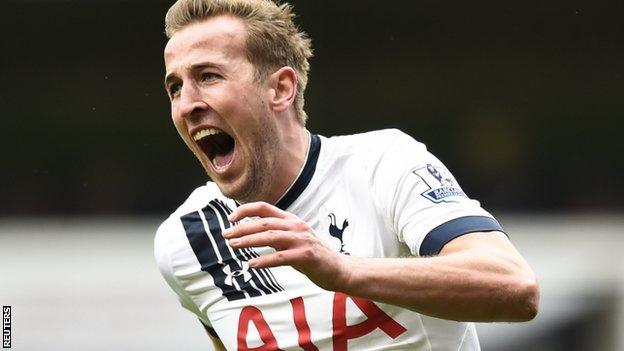
Harry Kane on Pochettino: "If you're tired, he wants you to train harder so you don't get tired. Recovery is important as well but when we train, we train at 110% and don't leave anything unturned. That's the way it is."
There's an emphasis on video analysis, too, and he will get players in to show them clips of good and bad moments.
Unlike his mentor Bielsa, Pochettino is not quite so single-minded and inflexible in his tactical system. He gives his players more freedom, more inspiration - within a clear structure. But he does love attacking football and that can be seen in the Spurs team.
Danny Rose called him "a friend" at the start of last season. Adam Lallana, who played for him at Southampton, searched him out at the end of Liverpool's game at White Hart Lane in October and obviously holds him in very high esteem.
But beware - cross him and you could be frozen out. Certain players on the outside say weeks have gone by without him speaking to them. After Andros Townsend joined Newcastle for £12m in January, he said he would have liked "a better exit". He had been cast adrift after he clashed with one of the club's fitness trainers.
Pochettino remains measured in public - sometimes bordering on soporific. He belongs to an ever-expanding group of managers who never seem to say anything interesting - but that plays well with his employers at White Hart Lane. No unnecessary problems, no needless headlines.
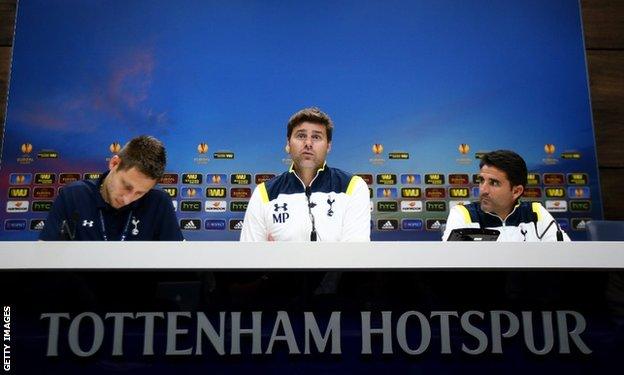
Pochettino now speaks to the media in English, something he rarely did during his time at Southampton
He does not moan about referees, discuss transfers, criticise other managers. In this regard Pochettino is the opposite of predecessor Harry Redknapp.
He might seem boring in interviews, but those who know him say he is socially adept, the sort of guy you would enjoy chatting to in the pub.
Perhaps he would be chatting to you about how hard he works his players, because until last month the team were still doing double training sessions each day - unheard of at that stage of the season.
He is also big on mutual respect and insists all players shake hands with each other every morning before training.
"It is just small things but it means a lot to create a real team," said the Argentine. "You feel your team-mates, you feel your people."
The story goes that one day the Spurs boss was having breakfast with chairman Daniel Levy when six players came up to them and shook their hands. Levy was taken aback.
If Tottenham do manage to overhaul Leicester and win their first Premier League title, there will be plenty more handshakes coming Pochettino's way this summer.
Additional reporting by Neil Johnston and Andy West.
- Published20 March 2016
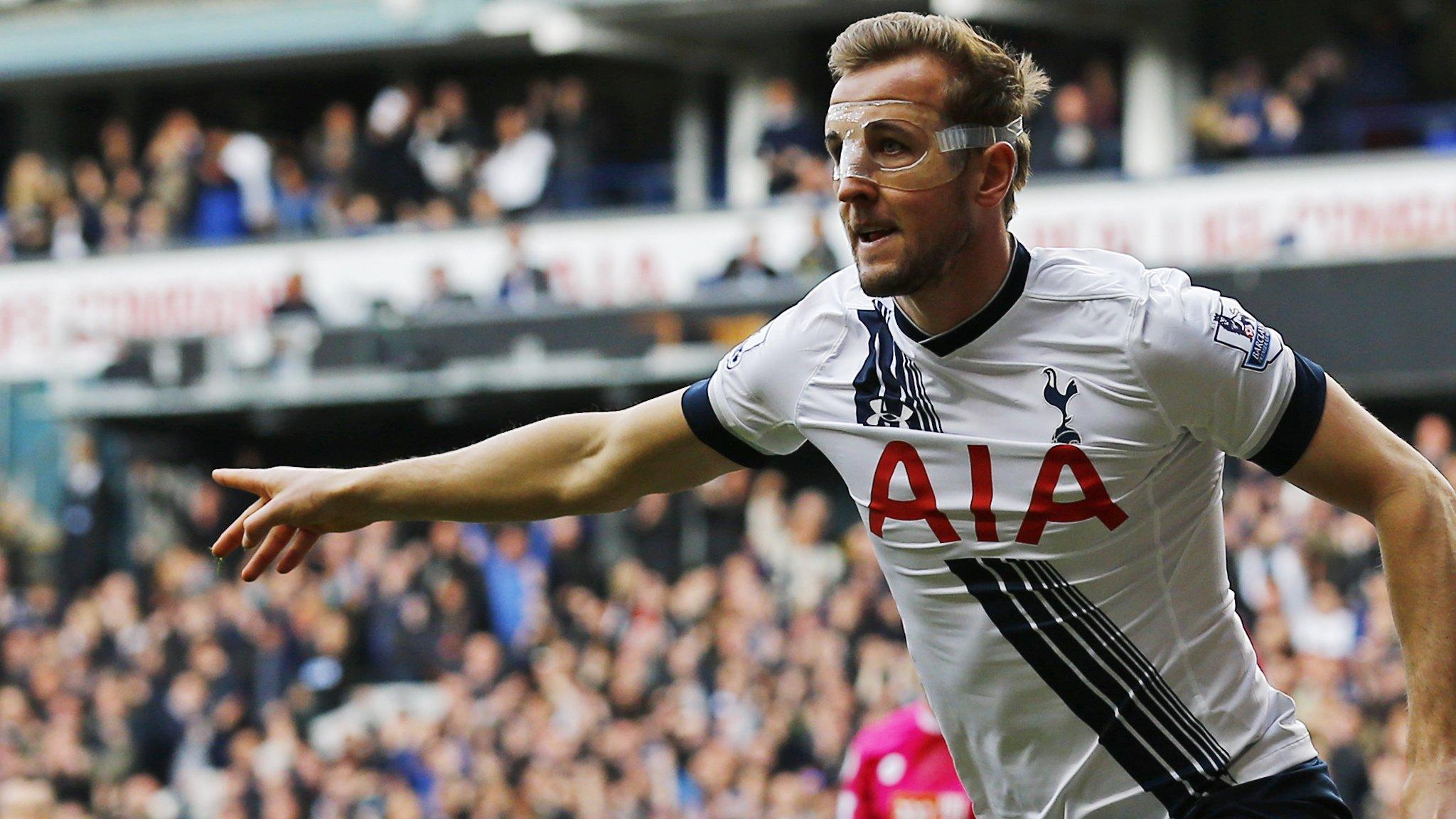
- Published20 June 2016

- Published7 June 2019
